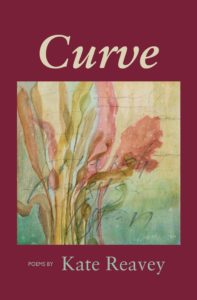 Review by Mary Ellen Talley
Review by Mary Ellen Talley
Kate Reavey brings a sense of the circularity of seasons and motherhood in CURVE, her first full length poetry collection. The five sections of free verse encompass an arc of personal experiences: motherhood, parenting, family life, cancer, and losing parents. Metaphorical and actual curves suggest a lyrical ebb and flow within an ocean of language and the natural world.
Desire for pregnancy begins the book. The first poem, “My mother’s nipples,” sets out with a heartfelt wish, “I ask for stretch marks / silver as the hairs across / my mother’s brow.”
Children arrive and beautiful poems of parenting and family life weave through the book. “The Waning,” is addressed to the poet’s first baby, “Come, child. Remind me that this moment will pass / and because I can’t hold it, I’ll hold you.”
Subtle differences between the mother’s and the husband’s approaches to life and parenting are conveyed in stanzas about Reavey’s children. In the poem, “My children proceed,” Reavey, the mother, is attentive to daughter Maeve reporting “zero dreams” which means no “nightmares, for now.” Consider how parents see a dead flicker on their deck, “a collection of spotted feathers / almost suggesting a bed.” The father “won’t bury / the bird” because he plans “to tie flies / from the scattering of feathers.” He sees:
a reflection of water, a fish rising
to catch sewn feathers believing
they are nourishment,
life, the precise light each of us
so wants to own.
Kate Reavey and her family live close to wilderness on the Olympic peninsula in northwest Washington. The natural world and constructs of language are currents that run through this collection. Both are exemplified in “Maple leaf” where Reavey speaks of veins present in both leaf and hand. She points out “so many o’s” as mourners at her father’s “midafternoon wake” say to her, “I am sorry for your loss.” As in other poems about humans, Reavey adds depth with natural world imagery. For example, she ends this poem observing that if her “father were here” he would look to the sky where “the heron and red-tailed and falcon leave a trail / only discerned by the wind.”
This poet skillfully takes the minutiae of life and moves it toward rendering profound messages. In “March 20, 2020,” the poet is listening to national news in the car on a “chilly overcast” day in the Pacific Northwest when she turns and sees “a path of cherry trees, blossoming / along each side of this paved road.” She indicates that the weight of the world’s worries have temporarily stopped weighing her down. Reavey is reminded of another moment of reprieve on a prior visit when she was with her daughter, as petals “drifted down,” a magical reminder of “snowfall.” The poet forgets the severity of the world and “the word border disappears.” This border reference reveals that the news reportage had been of walls and immigration, weighty topics that can burden the spirit.
The poem, “After a Line by Chief Dan George,” was written “for Dr. Christine Blasey Ford, the professor who testified before the Senate Judiciary Committee in 2018 regarding the nomination of Brett Kavanaugh to the Supreme Court. Reavey makes a basic but profound statement, “this body is your home.” The lines offer support and guidance from a woman and mother.
Reavey brings an underlay of grief to this collection. Poems about the deaths of her mother and father become part of the arc of this book, just as death is part of life. Three poems in section IV are titled “Grief,” “Grief II,” and “Grief III.” The poems show how the heartbreak of losing a mother can change over time just as fruit is transformed when preparing and giving blackberry jam.
Other poems consider our time in the universe as we go about our lives on this planet. In the poem, “Neowise,” the poet and her husband “lay wool blankets down // on the stubble of grasses, allow darkness to fold into night.” They lie under the sky “hoping to catch a / glimpse of Neowise, the comet everyone keeps / mentioning.” This sighting would have been in 2020. The next reappearance will be in 6,800 years. The addition of this poem gives CURVE a wider lens of time.
Like others of Reavey’s poems, “The word evening” honors language and lineage via vignettes about her own family. The father and small son are inside a warm well-lit home laughing as a tower of blocks falls down. The speaker is walking outside telling a story to her daughter who used to be afraid of the evening dark. There are trees, sunset, constellations, and a story of the sighting of limpets, crabs, and tiny mollusks at a low tide. As the pull of the round moon impacts the tides, the curve of Kate Reavey’s poetry offers a warm and satisfying celebration of the verities of life.
CURVE by Kate Reavey
Empty Bowl Press, 2022
ISBN 978-1-73704-088-0
Mary Ellen Talley’s book reviews appear online and in print journals such as Compulsive Reader, Asheville Poetry Review, and Crab Creek Review. Her poems have appeared widely in journals, such as Raven Chronicles, Gyroscope, Ekphrastic Review, and Banshee, as well as in multiple anthologies. A chapbook, “Postcards from the Lilac City,” was published by Finishing Line Press in 2020 and another is forthcoming from Kelsay Press. She resides in Seattle, Washington, is a mother and grandmother, and a former public school-based speech-language pathologist (SLP.)
